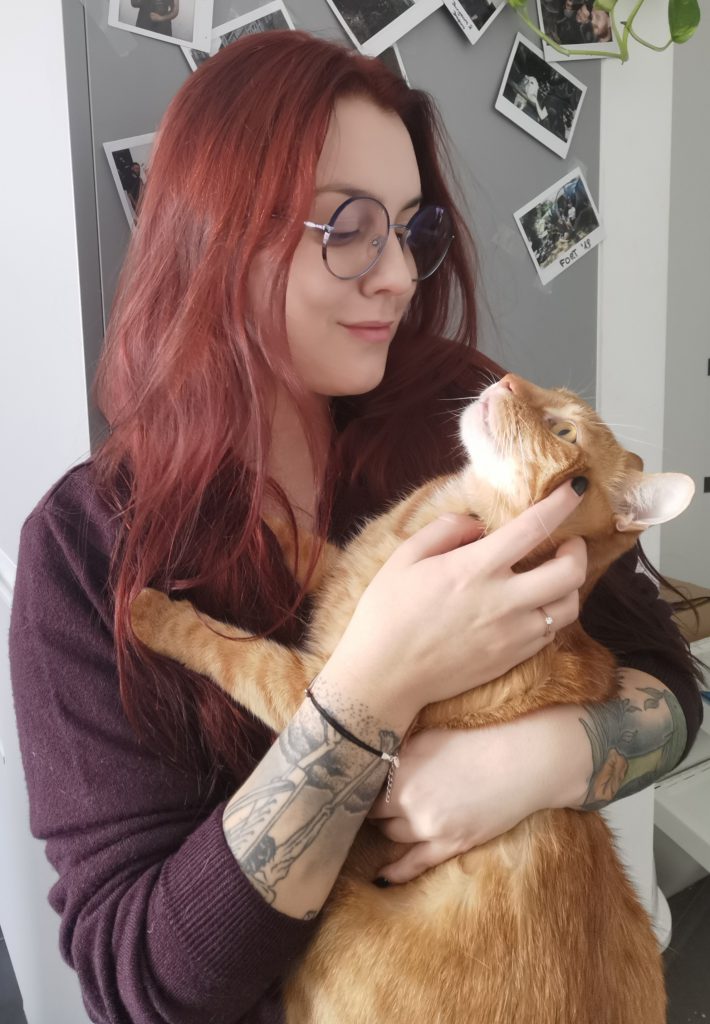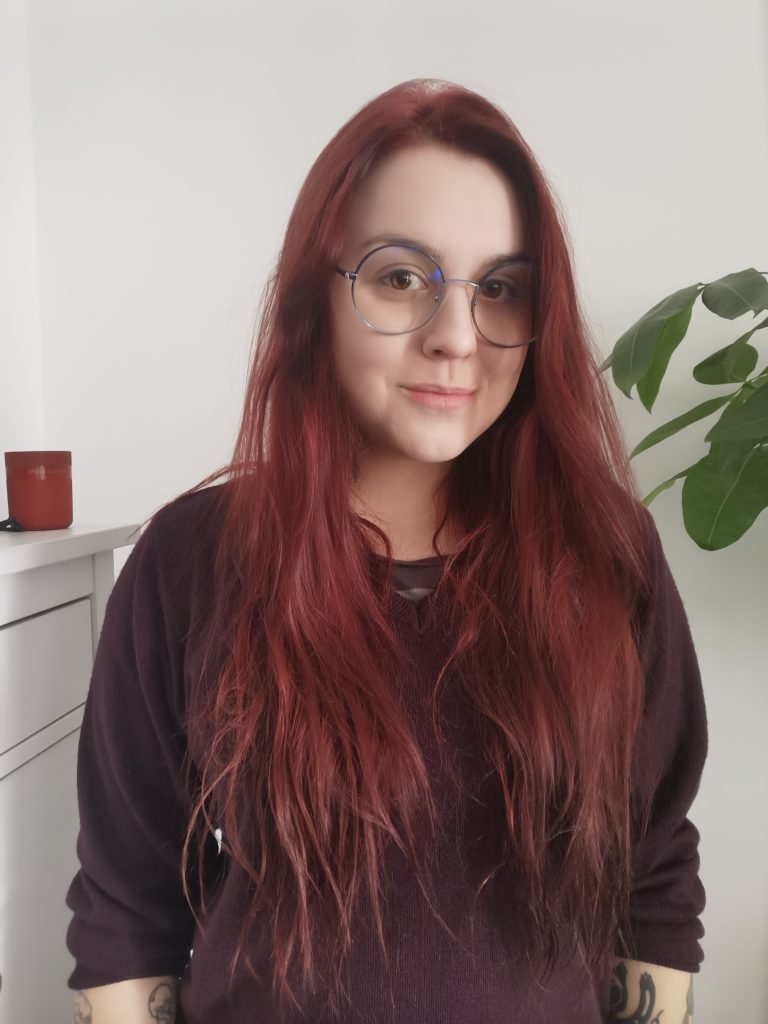We would like to introduce you to Aga – a professionally active person in the IT industry who functions with Asperger’s Syndrome. She has many personal achievements and aspirations for development. We invite you to learn more about her interesting story of constantly fighting stereotypes, testing an online casino, and communication within the IT team.
We begin our conversation with Aga, and, like you, we want to learn more about her beyond the fact that she works in IT. So we ask about her interests.
It turns out that Aga is a true Renaissance woman. She is a tester at a company that makes online gambling games. Online versions of poker, slot machines or roulette – all of these are ordered by online casinos and websites with such games. Aga moved from the quality control department of developed games to a team working on games in the development phase. In addition, her interests are strongly related to physics – she dreams of a career in physics, especially in the field of environmental protection. This ties in with her free time activities. She had planned to blog, but she says speaking is better than writing, so she decided to try her hand at the video format and make popular science videos.
As we are having this conversation, work is underway on her first material about marine plastic pollution. In addition, she has three cats and is getting ready to get married.
A typical “naughty child”
We are very positively surprised by the way Aga talks about it and how many things she does. You can see that she is genuinely fascinated by these topics and enjoys talking about them. So we ask about her disorder. What is the story behind her diagnosis and functioning with the syndrome?
Aga admits that she has always been a typical “naughty child” (a term used for children with disorders by uninformed people. It has grown into a kind of symbol – ed.). She talks about how she had been to many specialists, and since she was quite developed for her age mentally, no one at the time suspected that she had an autism spectrum disorder. The end result was that the diagnosis failed when she was a child.
The situation changed only when Aga was an adult:
I was 18 or 19 years old. I met the mother of a friend whose younger brother had already been diagnosed with Asperger’s syndrome. She told me to take an interest in the subject because I was a lot like him. So I did, and it turned out that even according to Google articles, I have quite a few symptoms. Then I started taking tests, went to several doctors, and actually got diagnosed with Asperger’s syndrome.
We asked Aga out of curiosity what the symptoms were.
I couldn’t work in a group, I couldn’t work with my peers, and I didn’t understand jokes very well. I also didn’t understand why other people didn’t care as much about things I thought were important – global warming, for example, is an issue that concerns me a lot. On top of that, various smaller mannerisms and habits, as well as sensory hypersensitivity.
She reveals that after the diagnosis, she felt relieved. It gave her an explanation for her behavior and parts of her personality, as well as an argument in situations where someone resented her behavior:
When someone accuses me of not understanding sarcasm, I say – “Hey! I am autistic! That’s the way it works.” When I was a child, I was often required to conform, and to be polite at school. I didn’t understand what I had to conform to and why I was apparently rude. The diagnosis gave me comfort in life, I began to adjust my life to suit my needs and understood that I can’t change some things and I don’t have to pretend. It’s so much easier this way.
Stereotypes about living with autism
When we hear about difficulties in living among typical people, we ask what the biggest problem for people on the spectrum is. The answer to this question, according to Aga, is communication. She stresses that atypical people need communication that is simple and clear, and, above all, they need to be heard. This also applies to work. Unfortunately, autistic people don’t always know what is appropriate to say and what is not. At the same time, Aga says that she is extremely direct and has no reluctance to end the party by telling the guests to “get their stuff” and leave because it is late and she is tired. She concludes by saying that people could be like that too.

Suppressing laughter to keep a professional face, we raise the issue of stereotypes. After all, there are quite a few of them operating in the public space. There are those talking about the alleged aggression of autistic people; others regard them unfairly as stupid. We ask what Aga thinks is the worst stereotype.
The answer is very original.
The biggest stereotypes I encountered were along the lines of: “You surely don’t have autism because you don’t look like having it, and you talk too much.” Or: “Do you like dancing in clubs and loud music? So, it doesn’t make sense; you can’t have autism.” People don’t understand that autism is a very individual condition and can have very extreme characteristics. I would like to fight the stereotype that it is a disorder in the sense of something terrible, that it is a tragedy. Parents are very often afraid that their children will have autism. They wonder, what it will be like, and how their child will deal with it. In this way, they sometimes take away children’s independence and, by being overprotective, make the children dependent on them. And all it takes is a little help and a little guidance. I am an example that a person with Asperger’s syndrome can have a job, passions, meet people, and have a husband… provided we make it to the wedding ;).
This time we can’t stop ourselves from bursting into laughter. Aga expresses herself very freely. You can see that talking and sharing her experiences comes very easily and naturally to her. She also knows how to garnish it with an interesting style of speech and a subtle pinch of humor. And she is, after all, talking about serious things. In our mind, we conclude that the idea of her own channel has really great potential. And out loud, we decide to ask about her communication skills, which are uncommon even for typical people – are they innate, or did she have to learn them?
Sense of humor
Most of them, it turns out, are the latter case. Interestingly, it was the diagnosis that allowed Aga to learn what she had lacked until that point. The sense of humor that captivates us so much so far, however, is natural. Interestingly, in her case, it is based on knowledge – Aga emphasizes that she likes and understands humor based on the action or non-action of something that should behave differently and various physical “groaners” (i.e., bad jokes – ed.). She completely misses the humor based on irony that is so popular today. She even recalls one situation:
Someone I know once told a joke at the dinner table: “I wanted to get a tattoo, and my mother agreed, but she told me to get it done in an unimportant place. So I got it done in Rybnik.” I then said that I also got tattooed in Rybnik and asked what studio he had chosen. I completely didn’t understand why everyone was laughing.
Some of the team is from Silesia and the joke clearly caters to their tastes (asperIT’s editors have nothing against Rybnik and sincerely greet all readers from that city). We talk for a while about how interesting it is that we are able to perceive the same message so differently.
A career in IT
We leave the humorous topics behind and move on to the main point of the interview – her career in IT. How did it happen that she ended up in this industry?
Aga begins by telling us that she was drawn to software development back in high school when everyone tried to dissuade her from physics. For this reason, IT was never her ideal field of study, but something that certainly piqued her interest. Eventually, it turned out to be a really enjoyable environment. We learn that she decided to try her hand as a tester at a startup that was looking for inexperienced people to train. They were working on the modern subject of smart cities, specifically smart, modern parking lots and apps to go with them. She liked it, and now the two worlds of both science and new technology are intertwined all the time in her life. Aga’s plan is to go to college and try her hand at fulfilling her dreams of getting a Ph.D. and working as an academic, but she is also currently working in the aforementioned studio. She stresses to us that the knowledge learned from computer science is incredibly useful in other fields.
But what about spectrum disorders at work? Does her team know about it?
Yes, although they didn’t know right away. Aga admits that she didn’t inform them about Asperger’s when she was interviewed so that it wouldn’t affect her in any way. Quite quickly, however, she informed the people with whom she was to work directly.
How did they react?
Very positively, there were absolutely no problems. They only asked about the details of exactly what are the symptoms of my disorder and what can happen in different situations.
Communication within the team
After making her little announcement in front of her co-workers, Aga also informed the manager and the supervisor. They, too, accepted the information with full understanding. Aga even reveals to us that the manager is still waiting for her to make a presentation on Asperger’s syndrome and present it to other employees. This information is very optimistic for us. It proves that employers with the right empathy and approach to people are able to employ people on the spectrum in the open labor market with full awareness. And even customize the workplace for these people – Aga tells us that she was given her own evacuation procedure. This stems from her hypersensitivity. If alarm sirens were wailing in the office, that amount of decibels would simply paralyze her and send her into a stupor (we find out about this literally in a moment, when an ambulance passing by the window with the siren on causes our heroine to completely stutter and make a pained face as she waits for the vehicle to drive away).
Asperger’s syndrome does not bother her when she works, creating only small communication problems. The team members are mostly older than her, and there are times when Aga doesn’t understand the topics they are discussing, especially if they involve children. However, this is not a serious problem because, as she told us, she has learned to talk to typical people. Asking questions and active listening are, according to her, good solutions for keeping the conversation going and strengthening the bonds in the group.

Her bosses reacted very appropriately to the news of the diagnosis. So we ask what advice can be given to other employers.
Advice for employers
The answer, as you can already guess, is quite clear after this conversation. First and foremost, it’s the simplicity of communication. Clear, calmly communicated instructions. Avoiding sarcasm and irony, vague terms. According to her, it is also a good idea to appoint a kind of mentor in the team – a person who is empathetic and willing to answer questions, explain the nuances of the work environment and provide general assistance. Such a person is especially useful in the first days of work when everything is unfamiliar, new, and stressful.
At the very end, Aga addresses other people on the autism spectrum looking for work with a plea and advice:
Autistic people […] shouldn’t be so worried when starting a new job. I’ve met many people who could be considered strange, and in the presence of some of them, Asperger’s syndrome didn’t come off as particularly “abnormal” at all. It is very common to stress that we will be the oddballs in the office, and this is unnecessary and untrue.
People on the spectrum are very meticulous, and I think they are really worth hiring in IT. Our qualities can improve the performance of many teams. We don’t do things just to get them done – we care about quality. We are often perfectionists, and we carry this over to work as well, which is very valuable and can be used in a cool way.
After these words, we thank Aga for the interview. We are sincerely moved by her ambitions and her story. We wish her to write many wonderful scientific papers, and many views on her future channel.

